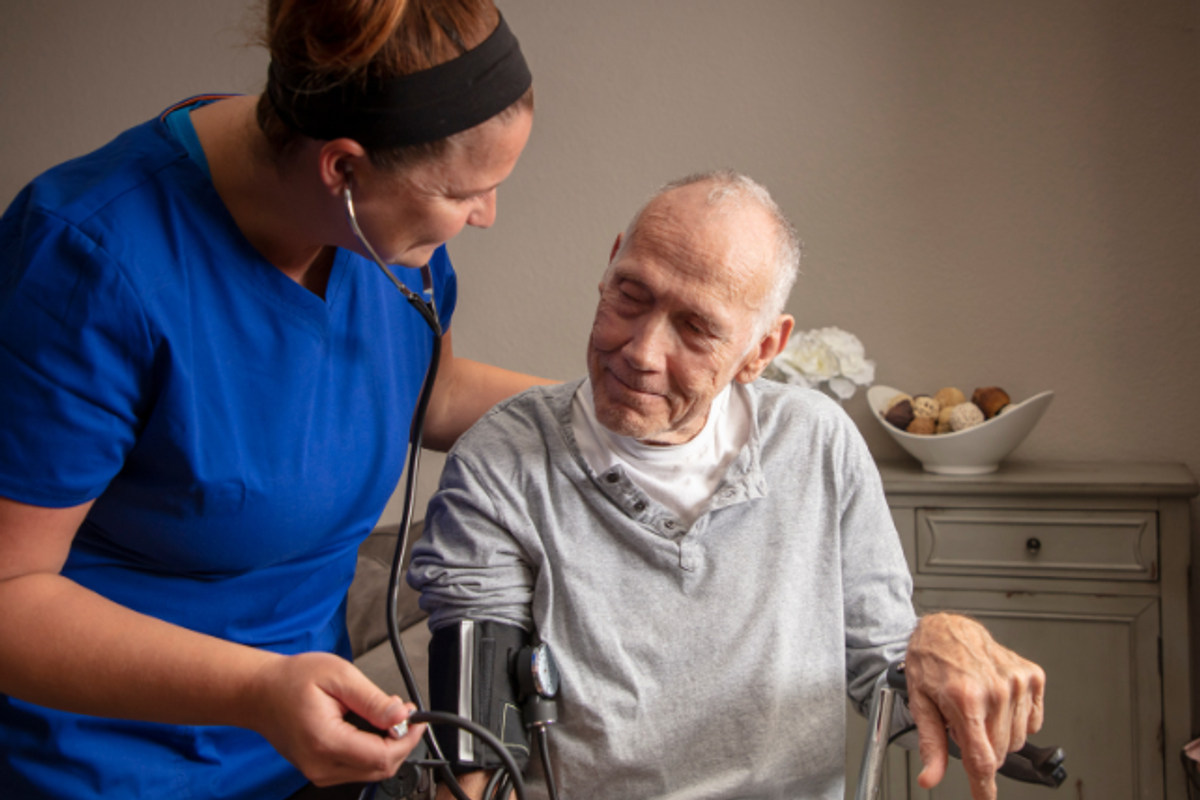Hospice nurse reveals the 'one sign' that someone is going to die within 4 weeks
It's called "visioning," and it's more comforting than it sounds.
A nurse explains how 'visioning' 3-4 weeks before death works.
Death is something, like it or not, we all must face. It's the final mystery, and it's totally normal to feel scared of the impending process. Experts say a few things can help, including using our fear to live a purposeful life and even making jokes, or using 'gallows humor'. One bit of good news is that we tend to get a little bit less afraid of death as we age. But in general, it helps to not shy away from death completely. Learning and talking about it is actually a good thing.
A new video by a hospice nurse shows an excellent reason for people to feel comfortable facing the unknown. Julie McFadden posts videos helping to demystify the dying process and bring comfort to people with a loved one in hospice care, or who may be dying themselves. Her profile reads, "Helping understand death to live better and die better." McFadden is also the author of the bestselling book, “Nothing to Fear.”
Hospice Nurse Julie has earned over half a million subscribers and has witnessed over a hundred deaths. In a recent video, she reveals that people are often comforted by friends and relatives who have passed away in their final days.
She says that when people begin experiencing these visions, it’s a sign that they will be passing away within a few weeks.
"Here's one sign that someone is close to death that most people don't believe happens,” Julie begins the video.
- YouTubewww.youtube.com
"Usually a few weeks to a month before someone dies, if they're on hospice, they will start seeing dead loved ones, dead relatives, dead pets. This happens so often that we actually put it in our educational packets that we give to patients and their families when they come on hospice so they aren't surprised or scared when it happens,” she continues.
The experience is called visioning; although no one knows how or why it happens, it’s common among all her patients.
"We don't know why it happens, but we see it in definitely more than half of our patients," she continues.
People often believe that the visions are caused by a lack of oxygen to the brain. However, Julie says that isn’t true. “Because when it does happen, most people are alert and oriented and are at least a month from death, so they don't have low oxygen," she said.
The good news is that the visioning experience is almost always comforting for those who are nearing the end.

It often involves relatives who 'come from the other side' to let them know everything will be okay and encourage them to let go and pass away. People also experience being taken on journeys with loved ones or having sensory experiences from the past, such as smelling their grandmother's perfume or father’s cigar.
These visitors can also appear several at a time. Patients might report the room feeling 'crowded' like they are being joined by many people at once. It's possible they may be visited by 'spirits' or people they don't know, though that's less common.
Christopher Kerr, a CEO of Hospice & Palliative Care, an organization that provides palliative care in Buffalo, New York, says that the relatives that often appear in these visions are people who protected and comforted the dying parent when they were alive. So, they may see a parent who nurtured them but not one they feared.
Kerr has extensively studied the mysterious phenomena that happen when people die but has no real explanation for why the visioning experience happens. “I have witnessed cases where what I was seeing was so profound, and the meaning for the patient was so clear and precise, that I almost felt like an intruder,” he told BBC Brazil. “And trying to decipher the etiology, the cause, seemed futile. I concluded that it was simply important to have reverence, that the fact that I could not explain the origin and process did not invalidate the experience for the patient.”
In a more in-depth video, Hospice Nurse Julie shares a real video of a dying woman experience visioning. It's extremely powerful:
- YouTubewww.youtube.com
Again, experts agree that once your loved one begins experiencing these visions, it's likely that they will pass on in the next 3-4 weeks. Remember that they are not a symptom to be treated or a concern to be addressed, as long as they aren't causing distress. They are simply a comforting sign of things to come.
It's comforting to know that for many, the final days of life may not be filled with pain and fear but instead with a sense of peace and joy. While we may never fully understand the reasons behind these mysterious visions, if they bring calm during such a daunting time, we can simply be grateful for their presence. They’re kind of like life, in general. In the end, we may not really know what it was all about, but we can be happy that it happened.
This article originally appeared last year. It has been updated.
- 102 days after his wife's death, Patton Oswalt describes grief as only he can. ›
- Hospice nurse shares clue she uses to know if someone is dying 6 months before it happens ›
- Hospice cat 'predicted' death, snuggling up to nursing home residents hours before they died ›
- A 'death box' may sound morbid, but it's actually a priceless gift for your loved ones ›
- What happens after we die? - Upworthy ›
- Hospice nurses share their patients' most shocking death bed confessions, and it's eye-opening - Upworthy ›

